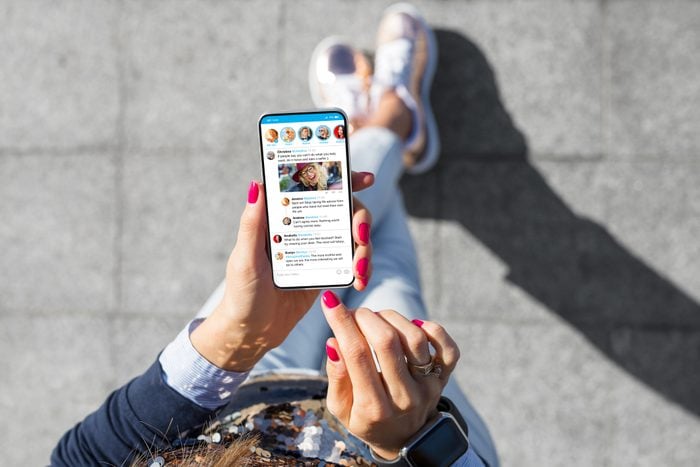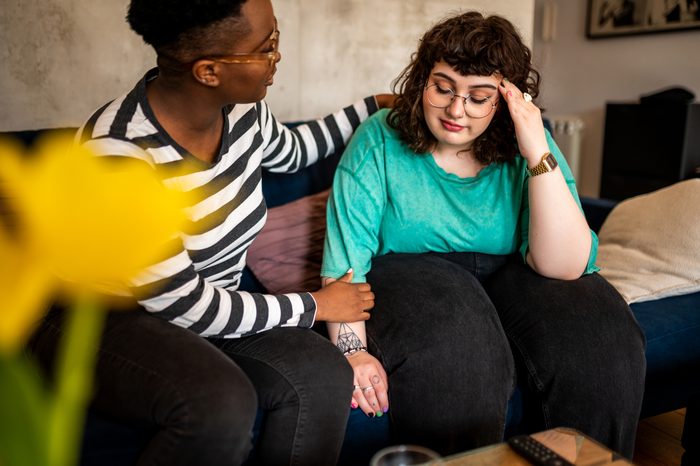
How not to be annoying to your friends
When it comes to living a long, healthy and happy life, your relationships are the single biggest factor in how you fare, according to the ongoing Harvard Study of Adult Development, the longest-running study of adult health and happiness in the world. And the research isn’t just talking about your romantic partners. In fact, some friendships can be just as, if not more, impactful over the course of your life. So knowing how important our friends are, how do we nurture these relationships and keep them strong? A good place to start is understanding how not to be annoying.
Many of us worry about being a burden to our friends, and the last thing we want to do is push our pals away. (After all, it’s hard enough to make friends as an adult!) But while we don’t go out of our way to be annoying, sometimes, no matter how hard we try, we still do things that can get on other people’s nerves. Thankfully, if your goal is to avoid being that person, there are steps you can take, from learning etiquette rules and etiquette mistakes (like these annoying texting habits) to understanding the polite habits most people dislike.
We asked relationship experts for intel on how not to be annoying and how to strengthen all your friendships. Read on to learn the habits that could be sabotaging your relationships—and what to do instead.
Get Reader’s Digest’s Read Up newsletter for more etiquette tips, humor, cleaning, travel, tech and fun facts all week long.

Waiting for the other person to reach out first
Maybe you feel socially awkward and aren’t sure how to reach out (does your friend even want to hear from you?). Or maybe you just didn’t think of contacting a friend you haven’t heard from in a while. Regardless of the reason, always waiting for your friend to initiate contact is super annoying and causes real damage to the relationship.
“Lack of communication is the No. 1 killer of all relationships, including friendships,” says neuropsychologist Sanam Hafeez, PsyD, director of Comprehensive Consultation Psychological Services in New York City. You don’t always have to be the first one to reach out, but you should be making a regular, consistent effort to call, text and invite your friend to do things. Lots of people react positively when a friend contacts them or when they run into a friend but don’t think to initiate the contact themselves. But being the one to reach out shows them that they are important to you, she explains.
Do this instead: To avoid a friendship recession, don’t wait for your pals to call or text you first—proactively reach out to them. “Check in with them regularly, and go beyond just saying, ‘Hey, how are you?'” she says. “Ask how their day was, how their job is going, how their family is. Ask about specific events or concerns they have.”
Pro tip: Most text, chat and email programs allow you to schedule messages in advance. So if you know your friend has an important event coming up, type in a quick “Thinking of you and hoping it goes well! Call me after!” text and schedule it to send that day. Or set a calendar reminder for yourself.

Pushing your political or religious views
You may see it as sharing something that’s important to you, but constantly bringing up controversial subjects may be annoying to your friends, especially if their views don’t align with yours. Calling it the “politics of personal destruction,” relationship expert, author and behavioral analyst Wendy Patrick, PhD, describes this as an annoying habit that can creep into friendships with differing world views. “If you are constantly talking about your political or religious views in a way that makes it clear that you are right and others are wrong, that gets old quick,” she says.
The thing is, you need friends who are different from you, who will challenge your thoughts and who will discuss big issues with you. It helps you build empathy and learn about the world. Insisting that people listen to your views without keeping an open mind to theirs is incredibly annoying.
Do this instead: You can and should have conversations about difficult issues with your friends, but start the conversation with how much you have in common with your friends and build from there. “Everyone wants national security, jobs, good education, safe communities, access to quality health care,” Patrick says. “Don’t lecture. Make sure you’re having a discussion, not a fight.”

Zoning out while they’re talking
Thanks to TikTok, YouTube and all the other stimuli giving us quick dopamine hits, many of us have a difficult time focusing when others are speaking (and that’s not even considering the large number of adults with ADHD!). But if a lack of communication is the biggest relationship killer, the antidote (and key to lifelong friendships) is attention, says Patrick. And the primary way we show people attention is by listening attentively.
Too many of us zone out while a friend is talking, thinking about our to-do list or what we want to say next. But people can tell when you’re only listening with one ear—and it can get really annoying if it happens often, she says.
Do this instead: “Put your phone away and give your friend your full attention when they are speaking,” she says. And, she adds, watch your body language. Don’t let your eyes glaze over. Sit with an open posture (don’t cross your arms over your chest or turn away from your friend), and nod and smile to encourage them to keep talking.

Not answering texts within a day
Love ’em or hate ’em, text messages are a primary way many people communicate with their friends. And even if you’re “not a texter,” it’s still important to acknowledge and respond to your friends’ electronic communications, says Hafeez. (And yes, this includes group texts!) This is true even if it’s something silly, like a meme—that’s their way of connecting with you.
It’s OK to not have your phone on you every second, but you should make time during your day to read and respond to texts and chats. It’s annoying and invalidating to send a text and get nothing but crickets in response. It’s especially irritating if your friends can see that you’ve read the message and still didn’t bother to respond.
Do this instead: “Respond to texts in a timely manner—within a few hours if it’s important but within a day, at the longest,” she says. “Do this even if you have to set a reminder in your phone to text someone back. This makes them feel valued.” Don’t have time to type out a full response? Acknowledge the text with an emoji, so your pal knows you received it. Then text that you’d love to talk more about this, noting when you’ll call or respond.

Texting constantly throughout the day
Texting back within a day: good. Texting all day long: yikes! Some people’s love language is texting, but you want to be careful not to overwhelm your friends, says Patrick. You may love to send memes, quotes, videos, GIFs and little thoughts to check in with loved ones throughout the day. And for friends who also thrive on constant communication, this works great. Unfortunately, some people feel easily overwhelmed by their phone notifications and constant bids for attention. “It’s not that they don’t care about you; they just can’t deal with that many messages,” she says. That’s why uninvited all-day chit-chat can be bad texting etiquette.
Do this instead: There is no “right” answer to how many texts are too many in a day, so ask your friends how they feel about texting! Check in about the frequency of your texts and respect their wishes if they prefer fewer texts. Some friends may prefer to chat over the phone or save important discussions for face-to-face meetings. Find the texting groove that works for you and your bestie.

Flaking on plans
Making plans and then bailing at the last minute is one of the top annoyances people have with friends—and rightly so, says Hafeez. You may see it as self-care or even poor time management, but when it happens chronically, it’s a clear signal to your friends that they aren’t a priority for you, she explains. Plus, when you cancel at the last second, you often cause other annoyances that your friends have to deal with, like changing reservations, transportation plans or activities.
Do this instead: Learn how to better manage your time. When you commit to something, immediately put it in your calendar and plan how you will prepare for the event. “If you have to cancel plans, make sure you let them know as soon as possible, and make an effort to rearrange plans for a time in the near future that will work with both of your schedules,” Hafeez says, adding that this should be only an occasional issue.
If you find yourself constantly needing to cancel, you should reevaluate your schedule and what you say yes to. You may need to politely decline certain invites.

Tagging them on social media without asking
Social media has been known to make or break friendships because it puts your relationship on public display—and not always in a good way. One way this leads to sticky situations: You tag your friend in pictures, posts and events on social media. Some people may be very private in general, says Hafeez, while others may have personal reasons they don’t want to be tagged in that specific post. (They may be trying to avoid being stalked by an ex, for instance, or don’t want their employer to know what exactly they used that PTO for!)
Do this instead: There’s a simple solution for how not to be annoying on social media: Just ask your friends before tagging or posting pictures of them. If they say no, it’s important to respect their social media boundaries like you would other boundaries, she says. That’s true regardless of the reason they’d rather not be tagged. And while you’re being cautious about your social media interactions, be mindful of what you write about others, avoiding even seemingly polite comments about their weight or age.

Gossiping about others
Want to know how not to be annoying? Take a hard look at the topics you bring up with friends.
Gossip is one of the rudest conversation habits. Some friendships are built on talking crap about mutual acquaintances, but while this can feel like bonding in the moment, it actually undermines your friendship—and gets annoying fast if others are all you have to talk about, says Hafeez. “Talking negatively about other people or other friends to your friend shows that you are not trustworthy or loyal,” she explains. After all, if you’re so willing to speak poorly about others, it’s natural for your friends to wonder what you say about them when they aren’t around.
Do this instead: “Practice empathy,” she says. “Before you choose to speak negatively about someone, remind yourself how you would feel if someone were to say those things about you.” There are a million interesting things to talk about—choose one of those instead of gossiping.

Saying “I totally know how you feel”
Understanding mental health etiquette means knowing the “polite” ways you’re speaking about mental health that are actually rude. When your friend shares something with you, it can be tempting to reply with “I know how you feel!” And while most people will understand the kind intention behind it, it can get annoying if you use this answer a lot, says Patrick. “You are trying to be helpful, and that is a good thing, but too many people confuse sympathy and empathy—and this can feel annoying and invalidating when someone is going through a tough time,” she says. “The truth is, you don’t know how they feel.”
Do this instead: “A better response would be active listening in order to learn how your friend is feeling,” she says. “Ask more questions, and let them tell you. Then validate their feelings.” Say something like, “I can hear how stressful this is for you! That makes a lot of sense given the circumstances. Can you tell me more about what you’re worried about?”

Sharing their good news for them
You would never share your friend’s secrets, but be careful sharing any news that isn’t yours, says Hafeez. Even sharing positive things about your friend—like a job promotion, a pregnancy or an engagement—without their permission can be annoying because it steals their ability to share it themselves. Revealing good news to others is fun, and you don’t want to take that away from your friend.
Do this instead: Avoid everyday friendship problems by thinking before you speak. “Be mindful of discussing anything personal or that could be seen as invading their privacy,” she says. If you’re not sure whether it’s OK for you to spread the news, simply ask first. And if you’ve accidentally jumped the gun, do your friend the courtesy of apologizing for the snafu.

Complaining about everything
One of the beautiful things about close, lifelong friendships is your ability to share your deepest thoughts and feelings without fear of judgment. But some people take this to the extreme, venting constantly to their friends about everything from their boss to the barista to the weather, says Patrick. Sharing hard things is fine and can be a bonding experience, but being constantly negative is annoying and draining—and one of the fastest ways to kill a friendship, she says.
Do this instead: People like to be around happy people. This doesn’t mean you have to be Little Miss Sunshine all the time, but make sure you have a balance of positive and negative things you discuss. “Be aware of what you’re talking about and keep complaints in check,” she says. “Make sure you’re asking how they are and not just talking about your own feelings.”

Being chronically late
For some people, being 15 minutes late to every event is so common that their friends think of tardiness as one of their personality habits and will even joke about it. But it’s not funny. While you may see being a little late as an endearing quirk, it’s really annoying and a red flag that you don’t value your friends’ time, says Patrick.
Do this instead: “Being late isn’t cute, but it’s not a character flaw either—it’s a problem with time management, and it can be fixed with proper planning,” she says. “Taking steps to be appropriately on time shows your friends that you care about them.” This may mean putting events in your schedule a half hour early, setting reminder alarms or picking out clothes the day before.

Interrupting when they’re speaking
Listening without interrupting is friendship 101, and yet it’s astonishing how many of us still interrupt our loved ones, says Hafeez. “It doesn’t get more annoying than being constantly interrupted when you’re trying to share something,” she adds. Interrupting isn’t just verbal either. Other ways of interrupting your friend include checking your phone, getting distracted by a task, typing, speaking to someone else and watching TV while they’re talking,
Do this instead: Don’t talk when they’re talking, and give them your full attention. “Be a mindful and intentional listener,” she says. “Show interest in what they are saying by nodding or making small affirmative comments, but do not interrupt. This makes them feel heard and understood.”
With that, you’re well on your way to stronger friendships. Now prepare your manners for your next night on the town by making sure you know how to avoid the so-called polite habits restaurant staffers dislike.
Sources:
- Sanam Hafeez, PsyD, neuropsychologist and director of Comprehensive Consultation Psychological Services in New York City
- Wendy Patrick, PhD, relationship expert, author and behavioral analyst
